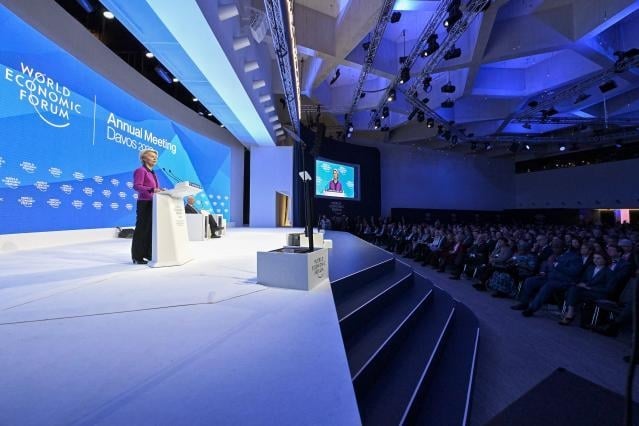
Following months of discussion and encouragement from the European solar industry, the EU has announced a multi-pronged scheme to drive renewable energy and clean technology development, with the aim of putting the European market at the forefront of the global energy transition.
The announcement has the potential to prove a significant boon to European solar PV production.
Unlock unlimited access for 12 whole months of distinctive global analysis
Photovoltaics International is now included.
- Regular insight and analysis of the industry’s biggest developments
- In-depth interviews with the industry’s leading figures
- Unlimited digital access to the PV Tech Power journal catalogue
- Unlimited digital access to the Photovoltaics International journal catalogue
- Access to more than 1,000 technical papers
- Discounts on Solar Media’s portfolio of events, in-person and virtual
The Green Deal Industrial Plan was announced yesterday by European Commission president Ursula von der Leyen in a speech at the World Economic Forum that directly positioned the plan as a response to both the Russian invasion of Ukraine and other global renewable energy legislative commitments like the US’ Inflation Reduction Act (IRA).
“It is no secret that certain elements of the design of the Inflation Reduction Act raised a number of concerns in terms of some of the targeted incentives for companies,” she said.
Von der Leyen said that the plan will cover four key pillars: the regulatory environment, financing, skills and trade.
The first pillar will see the introduction of the Net-Zero Industry Act, which will specify goals for European clean technology by 2030 and focus on faster and simplified permitting for clean tech production and manufacturing. Clean tech projects deemed to be of Common European Interest will also see faster processing and simpler funding and accessibility.
Alongside the Net-Zero Industry Act, the Critical Raw Materials Act will aim to boost the refining, processing and recycling of rare earth metals and raw materials essential to producing renewable energy assets. Von der Leyen also said that a focus would be placed on cooperating with trade partners on sourcing, processing and production of these materials to overcome China’s dominance of supply.
“For rare earths, which are vital for manufacturing key technologies – like wind power generation, hydrogen storage or batteries – Europe is today 98% dependent on one country – China. Or take lithium. With just three countries accounting for more than 90% of the lithium production, the entire supply chain has become incredibly tight. This has pushed up prices and is threatening our competitiveness”, she said.
The second pillar of the plan as outlined by the speech will boost investment and financing for clean tech production and manufacturing. Specifically, it will temporarily alter state rules to speed up and simplify the process for EU financing for member states; von der Leyen gave the example of simple tax breaks and targeted aid for production facilities “to counter relocation risks from foreign subsidies”.
In the medium term, a European Sovereignty Fund will be prepared to boost the resources available for “upstream research, innovation and strategic industrial projects key to reaching net zero”. The scope of this fund was not clarified.
The Green Deal Industrial Plan will also develop the skill base of workers to enable the bloc’s net zero plans and establish an ambitious and robust international trade agenda to secure supply chains.
The president also highlighted that unfair trade practices that make the energy landscape uncompetitive must be addressed, specifying China’s global domination in much of renewable energy production.
The specific financial and legislative details, and the ultimate scope of the Green Deal Industrial Plan are yet to be revealed.
“The Green Deal Industrial Plan is a significant moment for European solar manufacturers. The EU is seriously acting on the concerns of the European solar sector over the last months and years,” said Dries Acke, policy director of trade body SolarPower Europe.
“We’ll need to get Europe’s 2030 solar manufacturing targets right, reflecting the strategic role of solar as the kingpin of the energy transition.”
The announcement comes after months of petition and discussion from the European solar sector. In December the European Solar Manufacturing Council called for IRA-style tactics to be implemented to shore up a European PV manufacturing base. In fact, it called for a finance vehicle akin to the Chips Act introduced to bolster Europe’s competitiveness with semiconductor technology. Von der Leyen cited the same act in her speech.
A flurry of regulatory activity regarding the solar industry has come out of the EU in recent months, most notably the inauguration of the European Solar PV Industry Alliance and amendments to the REPowerEU scheme that cut solar PV permitting times and established designated ‘go-to’ renewable energy zones.







